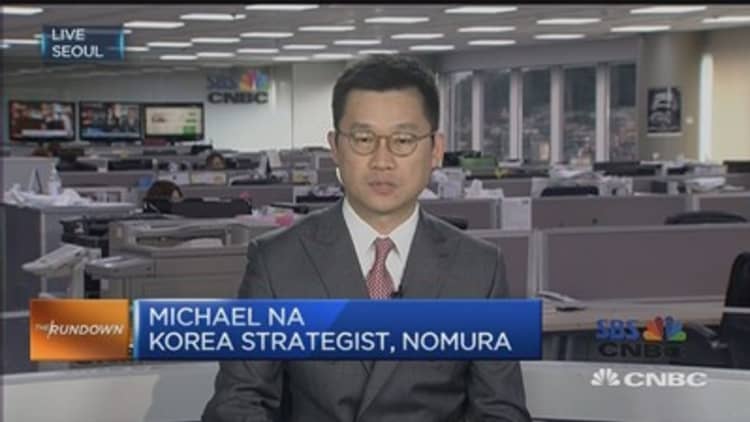Samsung C&T shareholders approved a $7.7 billion all-stock takeover offer from Samsung's de facto holding company Cheil Industries on Friday, underlining the dominance of South Korea's family-run conglomerates, or chaebols.
Shares of Samsung C&T and Cheil Industries lost as much as 9 and 7 percent respectively, while Samsung Electronics popped 2 percent after the decision was announced.
The proposed deal is part of a restructuring program driven by the founding Lee family to consolidate power over Samsung Electronics, the prize of all the Samsung affiliates. Buying Samsung C&T would give Chiel control of the former's 4 percent stake in Samsung Electronics, making the new entity created under the merger one of the largest investors in the smartphone maker.
The move would also help the Lee family cement their grip on the Samsung brand ahead of a key leadership transfer. Lee Jae-yong, currently vice-chairman at Samsung Electronics, is widely expected to take over once his father and current chairman Lee Kun-hee officially steps down. The health of the senior Lee remains in focus after he suffered a heart attack last year.
"Looking at [Thursday's] share price of Cheil Industries, the stock was up quite a bit so I think the market was betting that Samsung would get the merger to go through," said Michael Na, Nomura's Korea strategist, adding that Samsung tried really hard to win over retail investors. Cheil shot up as much as 5 percent on Thursday.
Elliott vs Samsung
U.S. hedge fund Elliott Associates, Samsung C&T's third-largest shareholder, opposed the terms of the merger in a rare display of shareholder activism in South Korea, saying it greatly undervalued Samsung C&T while overvaluing Cheil Industries.
Elliott has a 7 percent stake in Samsung C&T and CEO Paul Singer has been sharply critical of the deal. Speaking to CNBC at the Delivering Alpha conference in New York this week, Singer said the merger should be rejected so it can serve as an example of more stringent corporate governance in South Korea.
His argument is persuasive, noted Ji-Soo Lee, senior consultant at the Center for Good Corporate Governance.
"For the past few years, Samsung C&T's stock price has gradually decreased. Markets say current prices don't reflect the firm's intrinsic value, while Cheil Industries has hit its peak. Furthermore, Cheil just went public six months ago so it seems like the merger ratio is quite unfair to C&T shareholders."
South Korea's National Pension Service (NPS), which holds the largest stake in Samsung C&T at 9.9 percent, said last week that it supported the takeover. Nomura noted that the NPS was justified in its stance since it also owns about 5 percent of Cheil Industries. If the merger didn't pass, Cheil shares could plunge, hurting its valuation, the bank explained.

Friday's vote comes as Elliott filed an appeal on Thursday to South Korea's Supreme Court, after a lower court ruled against its attempts to block the merger.
The fight with Singer turned particularly ugly on Thursday on news that, following protests from Jewish groups, Samsung C&T had removed alleged cartoons depicting Singer as a vulture-like figure on its website. Singer is Jewish. According to the Associated Press (AP), the images were online for several weeks and Samsung C&T reportedly asked the AP not to publish the story before Friday's meeting.
The firm issued a statement later in the day, saying "we categorically denounce anti-Semitism in all its forms, and we are committed to respect for all individuals."
Family dynasties
Elliott's complaints have indeed shaken the chaebols—a key pillar of Asia's fourth-largest economy—and renewed debate about their sustainability. The term chaebol comes from the root words chae, meaning wealth, and bol, clan or faction.
The controlling family of a chaebol is known as the Controlling Minority Shareholder (CMS) because their control rights exceed cash-flow rights. Negative consequences of the system typically include mandatory support of distressed subsidiary firms, excessive concentration of power within a small group and inheritance of the CMS position by heirs who may not be qualified to effectively shape the future of large companies.
Apart from Samsung, other well-known chaebols include Hyundai Motor Group, Daewoo Group and LG.
Read MoreSouth Korea offers free visas to lure Asian tourists
"Chaebol owners control a vast network of companies through a circular holding structure. If you break one of the links, the whole structure becomes very vulnerable," Na commented.
Earlier this year, President Park Geun-hye announced a plan to reduce the country's reliance on the conglomerates, promising to support start-ups and a creativity-driven economy instead.
"The chaebol system has been highly criticized over the past decade but it hasn't changed much, so I hope Samsung learns a lesson from this," said Lee.
"Recently, chaebols haven't been delivering growth or creating jobs so from the public's perspective, what have they done for us lately? I think the public is turning their back on them, they have to improve going forward in terms of shareholder return policy," Na added.
Indeed, there has been a recent public backlash against chaebol families, particularly following last December's 'nut rage' incident. Heather Cho, daughter of then-Korean Air chairman Cho Yang-ho, demanded a flight return to its departing gate because she was served macadamia nuts in a bag instead of on a plate. The incident triggered angry criticism, with the public referring to chaebol families as privileged and spoilt.

